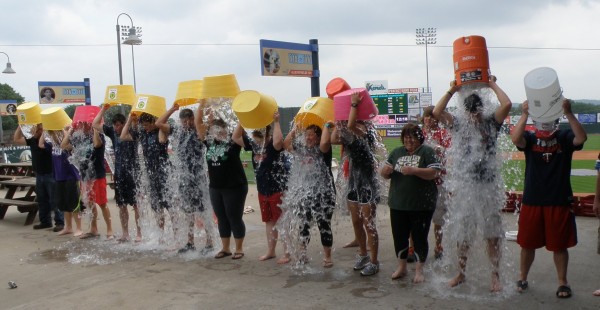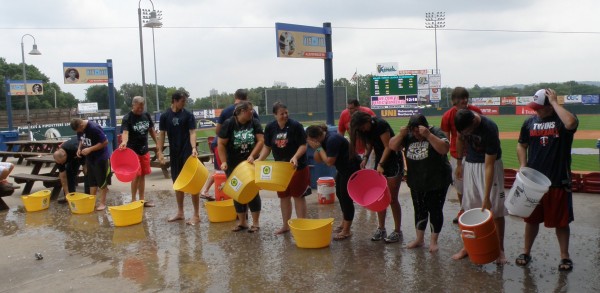Tuesday night’s Cedar Rapids Kernels come-from-behind win over the Quad Cities River Bandits was bittersweet.
On the one hand, they tallied three runs in the home half of the eighth inning and put away the Bandits for their eighth straight win. They swept three games in Beloit last week, three more from Peoria in Cedar Rapids over the weekend, and now the first two games of their series with the Bandits. The team also played to near-capacity home crowds on Friday and Saturday night.
On the other hand, Kohl Stewart, the Twins’ first round draft pick in 2013 and a key member of the Kernels’ rotation all season long, left the game during the second inning with an as-yet-undetermined ailment. Regardless of the ultimate cause, it’s a pretty safe bet Stewart has thrown his last pitch for this Cedar Rapids club in 2014.
Stewart was one of the few bright spots for the Kernels during a challenging first half of the season. He notched a 2.44 ERA over the course of a dozen starts prior to the Midwest League’s All-Star break in mid June.
The Kernels finished sixth among the MWL Western Division’s eight teams in the first half race with a 31-39 record, 14 games behind the first half West champion Kane County Cougars and 7.6 games behind second-place Burlington.
The Midwest League breaks their schedule in to two halves, with the top two teams in each division, in each half of the season, qualifying for the postseason.
The Kernels have certainly taken advantage of the split season arrangement by turning their season around 180 degrees in the second half.
With 13 games to play following Tuesday night’s win, the Kernels sit one game behind Kane County in the MWL West’s second-half standings.
Since the Cougars clinched their playoff spot in the first half, however, it doesn’t matter how the Kernels fare with them. What matters is that they finish among the top two teams in their Division who have not already qualified in the first half.
Going in to Wednesday’s series finale with Quad Cities, Cedar Rapids holds a six game lead over third place Wisconsin and a nine game lead over fourth place Peoria. That means their “magic number” for qualifying for the playoffs sits at 5.
How did this happen? How did a team go from a 31-39 first-half record to a 36-21 record, so far, in the second half? Certainly, not many fans gave the Kernels much chance of making the playoffs two months ago.
Their manager, Jake Mauer, and coaches Tommy Watkins and Ivan Arteaga, gave their thoughts on the subject on Sunday, which was three Kernels wins (and three Peoria losses) ago.
“Pitching is probably number 1,” said Mauer. “We’ve shaved a whole run off our (team) ERA. Obviously we’re a little different at the back end of the bullpen than we were early on.”
It hasn’t all been improved pitching, however. Mauer also was quick to mention some newcomers to the offense that have contributed.
“Some of the additions, obviously Logan Wade and (Alex) Swim have been huge. Max Murphy’s been a good addition,” added the manager.
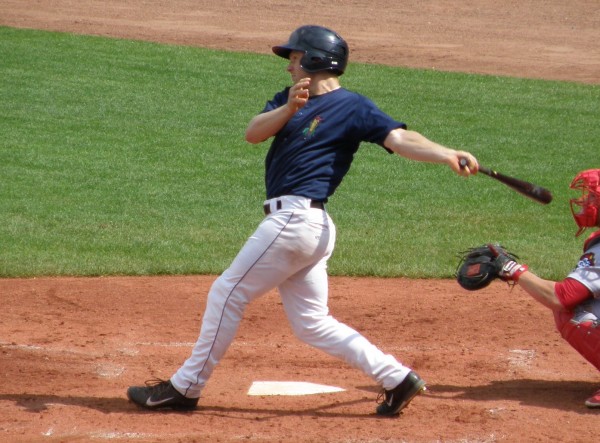
The Kernels have lost some very good players, as well, of course. Several pitchers and position players have earned promotions to high-A Fort Myers, which is what led to the new players arriving in Cedar Rapids.
Players coming and going is just part of minor league life.
Mauer pointed out another pretty major difference between his club’s first and second half fortunes.
“We’re keeping guys healthy, like (Mitch) Garver and (Engelb) Vielma and guys like that,” observed Mauer. “I think that really is the reason why we’re where we’re at.
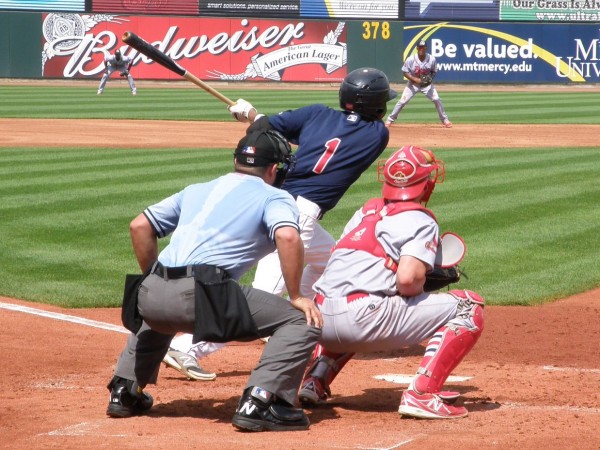
“We went through a tough stretch there early. It seemed like somebody was going down every week. We’re still missing three of our top arms in our organization who are still down with surgery. Obviously, it gave a good opportunity to get up here to (Mat) Batts and (Chih-Wei) Hu and (Stephen) Gonsalves and (Lewis) Thorpe. They’ve really been holding down the majority of the big innings for us.”
Watkins, the Kernels hitting coach, echoes many of Mauer’s thoughts.
“I think we’ve stayed healthy, for the most part. It seemed like every other day we were losing somebody in the first half. But for the most part, outside of some minor bumps and bruises, we’ve been pretty healthy the second half.”
Watkins also sensed a change in the consistency of the team’s performance.
“In the beginning, we didn’t click on both sides. One day we would hit, we didn’t pitch. One day we would pitch, we didn’t hit,” Watkins added. “Now it seems like we’re getting timely hitting, pitching. The defense is making some plays.
“All the pitchers are doing well but we’ve got a few guys at the back end of that bullpen that have been pretty lights-out for us. We give those guys some leads and they’ve been pretty good lately.”
Watkins has seen a change in the clubhouse, as well as on the field.
“I just think the overall confidence right now, the guys are a lot better. The guys are loose, they’re having fun with each other. We came in here the other day, they were doing Kangaroo Court with each other. They’re just having fun right now. They’re winning baseball games, so it’s been a lot of fun.”
There’s little doubt that the biggest change in the Kernels’ fortunes in the second half has come on the pitcher’s mound. That being the case, it stands to reason that Arteaga, the Kernels pitching coach, would have a great deal of insight in to how those fortunes changed for the better in the season’s second half.
He summed up the reasons for the improvement in the club’s pitching in two words, “Experience and chemistry.”
“They go hand in hand,” he explained. “Early, we went through some growing pains, pitching wise.”
Arteaga noted that the team lost three highly rated young pitchers in the first half that the organization had been counting on to play big roles for the Kernels. Felix Jorge struggled and was sent back to extended spring training and, ultimately, to Elizabethton. Randy Rosario and Yorman Landa got hurt, ending their seasons.
Pitchers that remained in Cedar Rapids also went through some rough patches early.
“(Aaron) Slegers had a rough go for about a month,” added the coach. “He was working on some stuff. (Ryan) Eades was learning a lot of things about the league and about himself. Our relievers went through some growing pains. We had Hudson Boyd – early, he was very good. He had a rough go for about three or four outings.
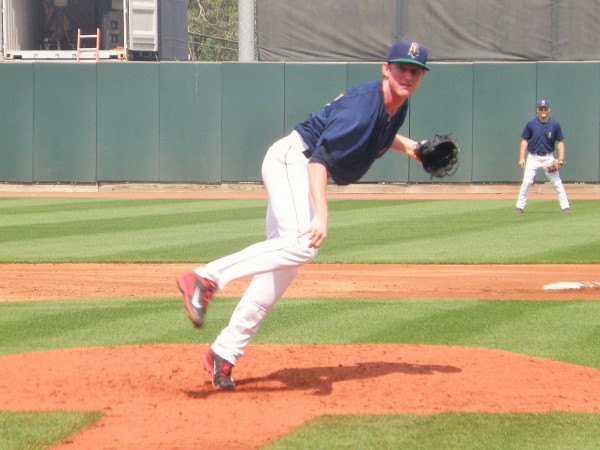
“So everybody’s learning. Like I said when I first got here, it is a process. They get to learn the league. They get to learn the hitters. They get to learn themselves. Work on a different pitch, work on the delivery. Work on some stuff.
“It’s growing pains. Kids like Eades, you know, second round pick, he learned a lot this year. And you get a guy like Stewart – first round pick. He learned a lot this year. In the first half, you have a lot of learning to do. A lot of growing pains.
“And we didn’t do that bad. Not what we wanted to, but we weren’t that bad.”
In the second half, though, the pitching went from, “not bad,” to very, very good.
“Then we got the new boys. We got Thorpe, we got Hu, we had Gonsalves, Batts, Burdi, Reed, Gallant. They brought a different mindset and obviously we’ve been doing very well.”
Arteaga also agrees with Watkins’ observation that the success is reflected off the field as much as on.
“I think that the learning, gaining some experience and at the same time, we’re winning. You see a different atmosphere in there ( the clubhouse). It’s a different environment. It’s chemistry. They like each other. They talk to each other. When you get that, which is chemistry, it shows on the field.
“They come here every day with effort, with a purpose they have in mind. They know, they can feel the possibility of being in the playoffs – how great that’s going to be for the players to experience that. Some of them in their first year of full season. I hope that they actually embrace the possibility.”
If the players are excited about postseason possibilities, they aren’t alone. Arteaga is right there with them.
“Personally, I’m very excited by it because I went through a lot of things this year with these guys. To try to teach the pitchers the fundamentals of baseball, the fundamentals of pitching, pitch sequence, just the growing pains. And just the things you see, to me, it’s very rewarding.
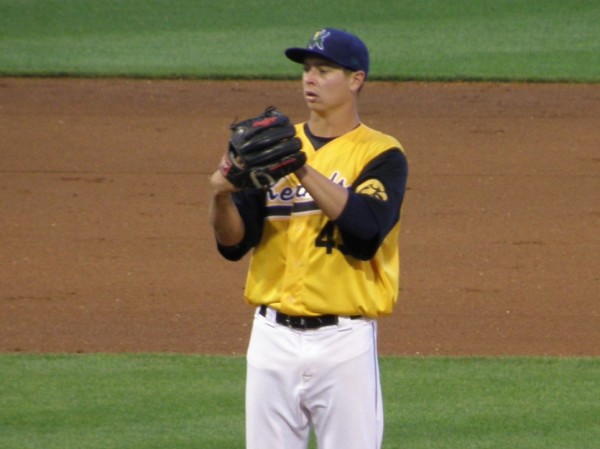
“I guarantee you that there’s not a better feeling than seeing these guys playing every day and understanding the moment. And going out and playing the way they played Peoria and the way they played on the road (in Beloit).”
Of course, winning championships is great. But is winning really important for minor league affiliates?
It’s important, of course, to the local fans who want to see a winner. But some fans of the Major League affiliate see minor league games as little more than exhibition games, attaching little, if any, value to won-loss record.
Arteaga clearly feels winning is important, but not necessarily the most important thing.
“We (the Twins organization) have a philosophy. Basically, we want to develop winners. And the only way you can develop winners is by teaching the process, by teaching the fundamentals of baseball.
“Now, we are very careful with the amount of innings, the activities that we do. Teaching the game the right way, the Twins way.
“But one thing that we don’t do, is to go the extra mile to try to win. We want these guys to win, but I won’t pitch my guys two days in a row. I won’t pitch my guy 125 pitches because I want to win one game. We won’t do that. We have a program. That program works. It’s good. We stick to it. It is our job as coaches to teach these guys how to win. To motivate these guys every day.”
Make no mistake, though, talking about a playoff run brings a smile to the coach’s face.
“When you go to the postseason, there’s a difference,” Arteaga concluded. “That’s what we want these guys to experience. When it’s only you. There’s nobody else playing, just you playing. (Others) going home. They’re going on American Airlines somewhere. You’re not. You’re still playing. That’s the beauty of postseason. You’re sending somebody else home and you’re playing. So that’s good.”
******
Finally, various members of the Kernels’ players and front office accepted the ALS ice bucket challenge on Monday this week.

